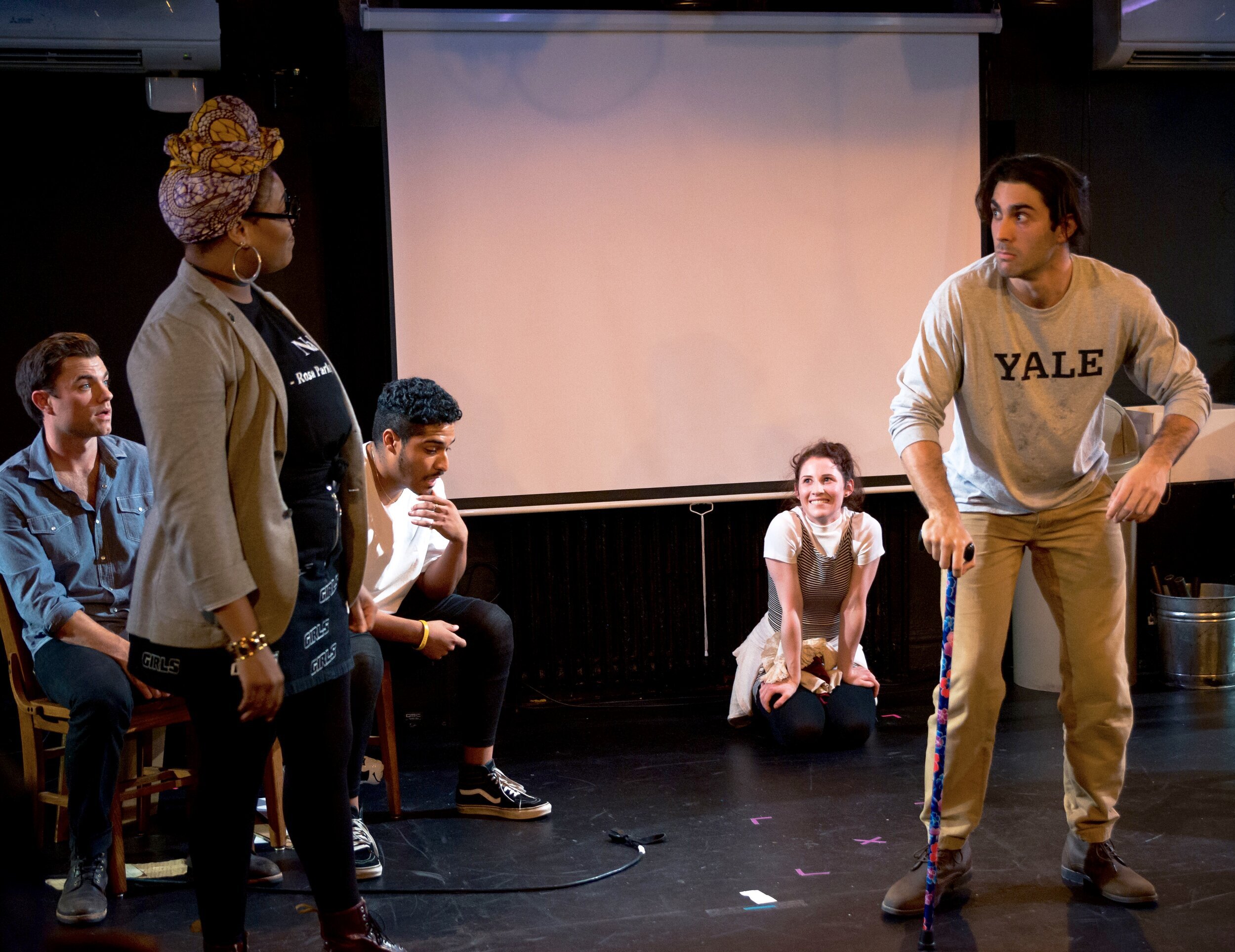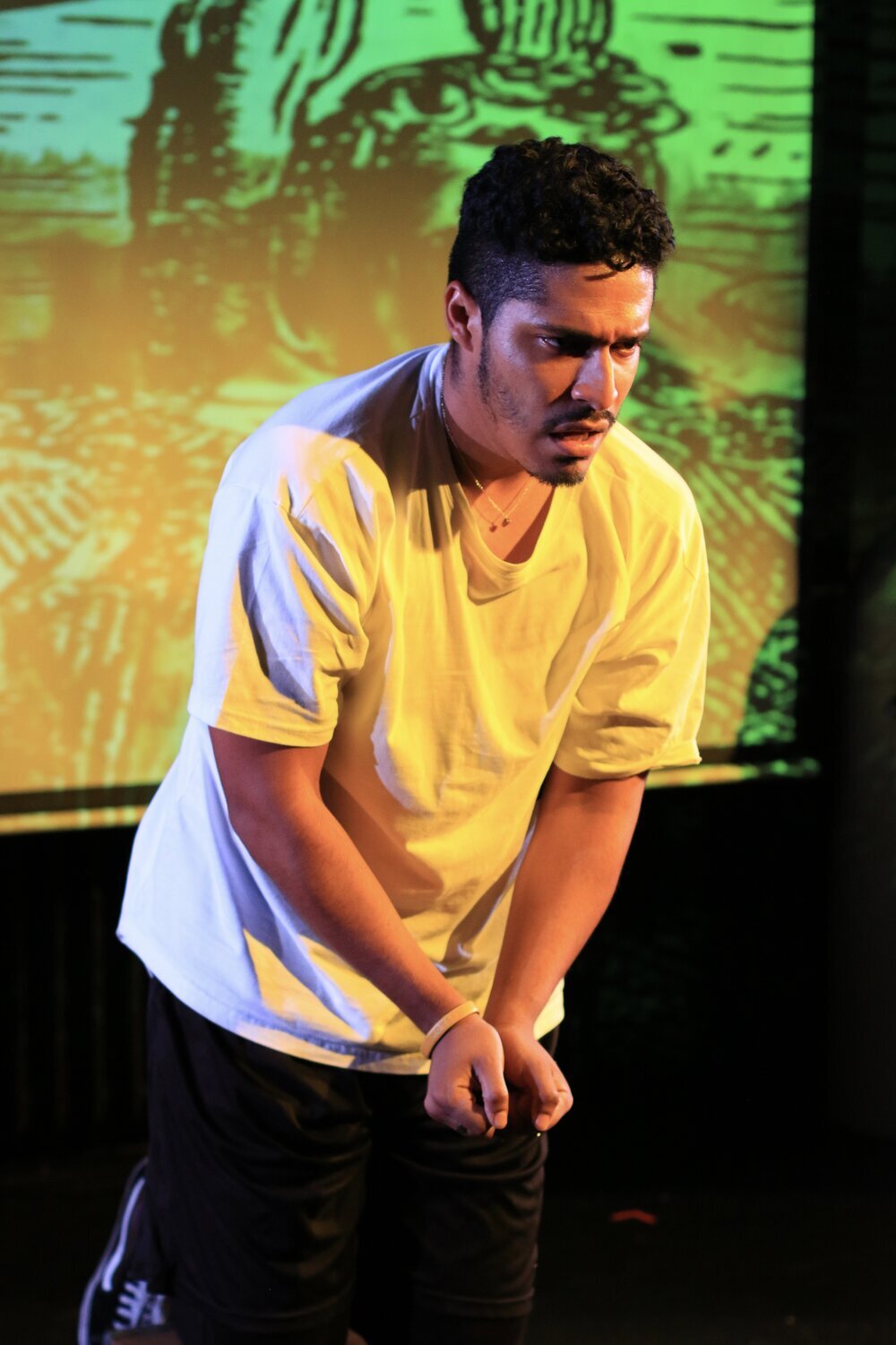The first show of the Yale Cabaret season 52 revisits Jackie Sibblies Drury’s We Are Proud to Present a Presentation About the Herero of Namibia, Formerly Known as South West Africa, From the German Südwestafrika, Between the Years 1994-1915. The play was featured in the Yale Summer Cabaret season of 2014 (review) and it’s easy to see that the play’s relevance has only increased in the past five years. The play investigates the problem of accurate presentation of atrocities that were largely expunged from the historical record or which were never acknowledged for what they were. The German-engineered genocide of the Herero population of Namibia has been called “the first modern genocide,” by which is meant, it seems, that it was systematic as opposed to a result of other policies. The difficult topic is the subject of the “presentation,” but the context for that presentation is the play itself. We witness a rehearsal of a play that tries to present, with some degree of humane depiction, a series of events that are unpresentable. All the actors—designated only by number and “white” or “black”—struggle with that problem while working within their skill set in trying to create characters and scenes.
Directed by Christopher Betts, a second-year director at the Yale School of Drama and one of the more dedicated to the Cabaret by number of past productions, We Are Proud to Present . . . builds on the unique magic of the space. Yale Cabaret audiences are often treated to staging that is improvisatory, or seemingly improvisatory. It’s not at all uncommon to find the kind of slippages between the fictive world and the actual world known as ‘breaking the fourth wall.” The Cab is uniquely situated to deal with a play in which actors in their twenties act out acting problems and issues. Finding the right tone for the “presentation” is a hunt, and here the question of what will satisfy viewers becomes not just a contextual question but one of creative differences and political sensitivity for the actors.
Robert Lee Hart, Doireann Mac Mahon, Manu Kumasi in Yale Cabaret’s production of We Are Proud to Present…, directed by Christopher Betts
Betts’ excellent ensemble cast—including two Cab debuts—captures the play’s necessary immediacy. We feel we’re “in the room,” as they say, taking in the kinds of discussion that are usually behind the scenes. One actor, designated as “Black Woman” (Alexandra Maurice), plays the “Artistic Director” and practices, with the help of index cards, patter addressed to the audience in the early going, just to get us on the page that the company is on. Once things get going with the “rehearsal” Maurice patiently, and searchingly, oversees a certain kind of controlled chaos that at times seems very real, at other times amusing satire on what actors “go through.” As a line in the program says—enumerating the production’s working rules of thumb (or “collaborative agreements”)—“Every voice deserves to be heard, but not all opinions are valid!” Just try putting that into practice.
Alexandra Maurice, Adam Shaukat (standing), Patrick Ball, Robert Lee Hart, Doireann Mac Mahon in the Yale Cabaret production of We Are Proud to Present…, directed by Christopher Betts
In the play, it means that some actors feel more gifted than others, some feel more engaged by their roles than others, and some want to claim a greater intuition into the lives being enacted. For instance, there’s a certain one-upmanship between Actor 4 (Manu Kumasi) and Actor 3 (Adam Shaukat), which becomes relevant in the era of “colorblind casting,” so that it may be up for grabs who gets to be a German and who gets to be a Herero. When Actor 3 tries to demonstrate that he too can play a wise old black woman, Shaukat is funny, offensive, and surprisingly effective by turns. Likewise, Actor 5 (Doireann Mac Mahon) has to play Sarah—a named German woman who becomes every woman that the German soldiers write to (these actual letters are among the few historical documents from the period). Mac Mahon runs a gamut of possibilities in trying to find the character’s motivation, from childlike to maternal to sexual to avant-garde improv. At one point she crawls about the floor as a cat as the cast puts her through her paces. While Actor 5 never quite arrives at a definitive turn as what Sarah might have been like, Mac Mahon displays quite memorably Actor 5’s discomfort with a built-in stereotype formulated by the soldiers’ pining, together with the problem of what the one white female character means for the play. It may just be the case that every actor thinks their role is the most problematic or important but Mac Mahon’s Actor 5 also shows that no role can be taken for granted.
Manu Kumasi, Doireann Mac Mahon, Robert Lee Hart in Yale Cabaret’s production of We Are Proud to Present…, directed by Christopher Betts
Time and again, the task of playing as cast is a matter of perspective. What the play knowingly evokes, with many comic turns, is the problem of who gets to tell whose stories and who gets to enact them. None of the characters in the play own the events, and none can really stand outside history to interpret what happened. While the situations are indefensible, they actually happened; and while enacting them any particular way is defensible, it’s also not definitive. Actor 1 (Patrick Ball) has to find a brutal soldier in himself and in doing so suddenly and shockingly becomes a Southern U.S. racist; Actor 2 (Robert Lee Hart) is the most self-assured and the actor most critical of the easy assumptions and analogies that the not-too-well-informed cast accepts. In the end he becomes the rehearsal’s scapegoat, if only because his sense of verisimilitude demands that the ugly truth of what the “presentation” addresses has to be enacted. It’s a brave performance by Hart who has a ready knack of being both within a role and outside it at the same time.
Robert Lee Hart in Yale Cabaret’s production of We Are Proud to Present…, directed by Christopher Betts
What the play dramatizes goes beyond our discomfort with the subject matter and the struggle to find a suitable tone. Ultimately it situates itself within what has become—with the advent of Black Lives Matter—a crisis in our culture, politically, historically, socially, and artistically. The racism that remains a part of U.S. reality can’t help but rise to the surface. In a country that prides itself on its noble experiment in liberty and wide political franchise, the story of what might be called our “premodern genocide” of the indigenous peoples of this continent and the story of the enslavement of peoples from Africa are not simply embarrassments or contradictions, they are part of an incendiary backstory that Drury keeps always in the periphery. Which is not to say that the uniqueness of the Herero’s slaughter is ignored nor that all historical injustices are the same, simply that when “we” proudly present a story it is already fraught with acts, identifications and justifications that we really aren’t proud of.
Adam Shaukat, Patrick Ball, Doireann Mac Mahon, Robert Lee Hart, Manu Kumasi in Yale Cabaret’s production of We Are Proud to Present…, directed by Christopher Betts
We Are Proud to Present a Presentation About the Herero of Namibia, Formerly Known as South West Africa, from the German Südwestafrika, Between the Years 1884-1915
By Jackie Sibblies Drury
Directed by Christopher Betts
Producer: Dani Barlow; Assistant Director: Tiffany Fomby; Scenic Designer: Jenn Doun; Costume Designer: April M. Hickman; Lighting Designer: Graham Zellers; Sound Designer: Noel Nichols; Projections Designer: Christopher Evans; Dramaturg: Alex Vermilion; Fight Choreographer: Mike Rossmy; Intimacy Choreographer: Kelsey Rainwater; Co-Technical Directors: Tatsuya “Tito” Ito, Jonathan Jolly, Rajiv Sha; Stage Manager: Edmund O’Neal
Cast: Patrick Ball, Robert Lee Hart, Manu Kumasi, Doireann Mac Mahon, Alexandra Maurice, Adam Shaukat
Yale Cabaret
September 12-14, 2019




